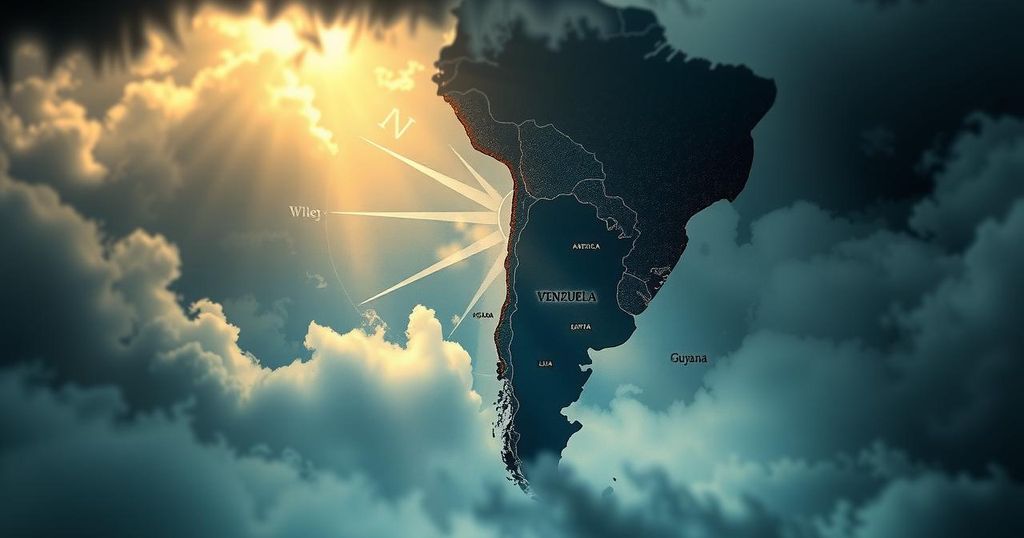The U.S. supports Guyana’s claim over the disputed Essequibo region, leading Venezuela to label Marco Rubio as an enemy. Venezuelan authorities question his motives, while international laws dictate the settlement process. Despite attempted resolutions through the ICJ, tensions rise with Venezuela asserting control and claiming sovereignty over the region, amidst allegations of political maneuvering by Maduro before upcoming elections.
On January 27, U.S. Secretary of State Marco Rubio expressed unwavering support for Guyana’s sovereignty over the disputed Essequibo region, prompting a sharp response from Venezuelan Foreign Minister Yvan Gil. On January 28, Gil labeled Rubio as “an enemy of our country,” accusing him of demonstrating an unhealthy obsession with undermining Venezuela’s interests. The Essequibo region, rich in resources, comprises over two-thirds of Guyana’s territory and has been under Guyanese administration for over a century.
Minister Gil criticized the U.S. stance, suggesting it supports “the fantasies of the Guyanese government” aimed at undermining Venezuela’s historical claims to the territory. He emphasized that the resolution of the territorial issue must align with the 1966 Geneva Agreement, highlighting the importance of compliance with international law and regional peace. However, Gil’s assertion regarding the Essequibo claim misrepresents historical agreements.
An international tribunal, established in 1899, confirmed British Guiana’s (now Guyana) sovereignty over Essequibo. Following Guyana’s independence in 1966, a United Nations-backed treaty mandates the settlement of territorial disputes via international arbitration. Since a failed agreement in 2018, U.N. Secretary-General Antonio Guterres designated the International Court of Justice (ICJ) to adjudicate the dispute, leading to diverging paths for the two nations.
Guyana has actively followed U.N. guidelines for resolution, whereas Venezuela has violated its international obligations. The ICJ agreed in December 2020 to confirm the validity of the 1899 award, but President Maduro has consistently disputed the court’s authority. Venezuela further escalated tensions by holding a referendum deemed illegal by the Organization of American States and announcing a new state named “Guayana Esequiba.”
In December 2023, President Maduro publicized intentions to exploit Essequibo’s natural resources, including oil and gas, while military presence along the contested border has steadily increased. Despite a mutual commitment to refrain from threats or force to resolve the dispute in December 2023, Venezuela continues to consolidate its military assets. The National Assembly later passed a controversial law recognizing Essequibo as a Venezuelan state, pending Supreme Court evaluation.
Analysts suggest Maduro may leverage the Essequibo situation for political gains ahead of the July 2024 elections, amid credible allegations of electoral misconduct. Recent construction of a bridge by Venezuela to Ankoko Island, claimed by Guyana, highlights continued tensions. The bridge connects Venezuelan territories to a military base operating in what Guyana claims is an illegal construction along its border.
The territorial dispute between Venezuela and Guyana centers on the Essequibo region, a resource-rich area governed by Guyana but claimed by Venezuela. The historic context includes a 1899 arbitration ruling that established the border and a 1966 treaty calling for resolution via the United Nations framework. Recent escalations, including Venezuelan legislative actions and military posturing, underscore the complexity of international law and national sovereignty in the region while political motivations play a role in contemporary developments.
The ongoing conflict between Venezuela and Guyana over the Essequibo region reflects deep-seated historical grievances and international legal frameworks. Venezuelan claims, rooted in national pride and resource interests, contrast sharply with established international rulings favoring Guyana’s sovereignty. As both nations navigate this contentious landscape, external diplomatic pressures and internal political strategies will significantly shape future relations and territorial governance.
Original Source: www.voanews.com






